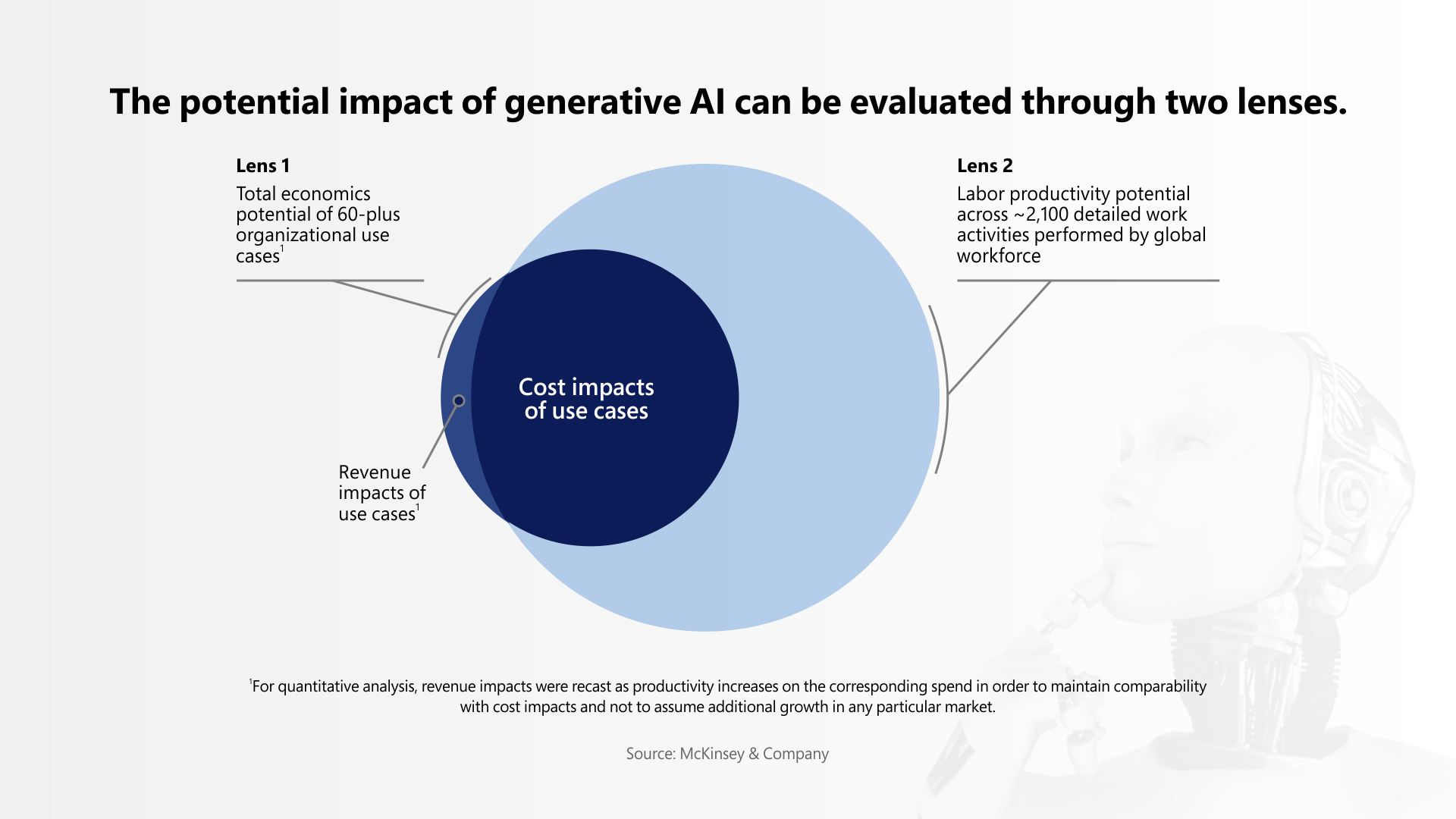
Introduction
Modern-day businesses are witnessing a rapidly evolving digital landscape. To match this pace, they must constantly search for innovative ways to remain competitive in the market and drive growth. In the last couple of years, one of the most trending technologies that has been the talk of the town is Generative Artificial Intelligence, aka Generative AI. This groundbreaking technology has the potential to accelerate digital transformation and deliver significant business value across various industries and business functions. This article will explore how Generative AI is reshaping the business landscape and driving digital transformation.
It has only been a couple of years since we were introduced to Generative AI, and it has already started significantly impacting almost every job role we can imagine. Initial trials and experiments have shown promising results. But still, a lot of advancements and updates are needed before we can incorporate this incredible technology into our daily lives. There are still concerns regarding the ethical and unbiased use of Generative AI tools. Apart from these, business leaders face challenges in managing inherent risks that come with implementing Generative AI, identifying necessary skills and competencies for the workforce, and reevaluating fundamental business processes.
There are endless possibilities with Generative AI technology, and it has an extensive real-world application.
Understanding Generative AI
Generative AI is the subset of Artificial Intelligence technology capable of generating different types of content, including texts, images, audio, and even video sequences. Generative AI can do this because of advanced deep learning techniques such as Generative Adversarial Networks (GANs) and Variational Autoencoders (VAEs). These generative AI models are trained on large data sets from where they can learn to identify intricate patterns and structures to produce new and unique contents that closely resemble that of humans.
As it continues to evolve, it offers immense potential across diverse sectors, from personalized content creation to healthcare advancements. However, it also necessitates vigilant consideration of ethical and privacy concerns, highlighting the importance of responsible development and deployment. In a world where innovation drives competitiveness, Generative AI emerges as a transformative force, accelerating digital transformation and fostering unparalleled creativity and efficiency.
How Generative AI Works?
Generative AI models are trained on large datasets of existing content, such as text, images, or audio. These models learn the underlying patterns and structures within the data, enabling them to generate new content often indistinguishable from human-created content. For example, Generative AI can create realistic images, write coherent text, compose music, and even generate video sequences.
Accelerating Digital Transformation
To anticipate the future, it's essential to comprehend the advancements that have paved the way for the emergence of generative AI. These breakthroughs, which have been in development for decades, have given rise to notable generative AI tools like ChatGPT, GitHub Copilot, and Stable Diffusion, which are currently in the spotlight. These tools represent the outcomes of substantial investments made in recent years, contributing to the progress of machine learning and deep learning. This investment forms the foundation for integrating AI applications into numerous everyday products and services that we rely on.
Gen AI is pivotal in accelerating digital transformation efforts for businesses. Here are some key ways in which Generative AI is driving this transformation:
1. Content Generation:
Content creation is a time-consuming and resource-intensive task for businesses. Generative AI can automate content generation, whether writing blog posts, generating product descriptions, or even creating social media posts. This not only saves time but also ensures a consistent and high-quality output.
2. Product Development and Design:
Generative AI can assist in product design by generating prototypes and 3D models. It can help optimize strategies based on user feedback and preferences, leading to faster product development cycles.
3. Data Augmentation:
Data is the lifeblood of AI models. Generative AI can generate synthetic data to augment existing datasets, making training and improving AI models easier. This is especially valuable in industries like healthcare and finance, where data privacy and scarcity are significant concerns.
4. Enhanced Personalization:
Generative AI enables businesses to deliver highly personalized experiences to their customers. For instance, it can generate customized product recommendations, tailored marketing messages, and even design custom user interfaces. This level of personalization can significantly enhance customer engagement and loyalty.
5. Automation of Repetitive Tasks:
Generative AI can automate many repetitive tasks, from chatbot responses to data entry. This frees up human resources to focus on more strategic and creative endeavors.
Business Value of Generative AI
Generative AI marks a significant leap forward in the evolution of artificial intelligence. As organizations rush to embrace and implement this technology, it's crucial to grasp its potential to deliver value to the economy and society. We've employed two complementary perspectives to gain insights into where generative AI, with its current capabilities, could make the most substantial impact and quantify that impact.
The first perspective examines various use cases where organizations can apply generative AI. These "use cases" entail applying generative AI to address specific business challenges, resulting in quantifiable outcomes. For instance, a use case in marketing could involve using generative AI to create personalized emails, reducing content generation costs and increasing revenue through more effective, high-quality content at scale. Our analysis has identified 63 such generative AI use cases spanning 16 business functions. Collectively, these use cases have the potential to yield economic benefits ranging from $2.6 trillion to $4.4 trillion annually when applied across industries.
This additional value could represent a significant contribution of 15% to 40% of the estimated $11.0 trillion to $17.7 trillion in economic value that non-generative artificial intelligence and analytics are currently projected to unlock. Notably, this estimate surpasses our previous 2017 projection, which anticipated AI contributing $9.5 trillion to $15.4 trillion in economic value.
Our second perspective complements the first by examining how generative AI could impact the work activities associated with approximately 850 occupations. We've developed scenarios to estimate when generative AI could undertake over 2,100 specific "detailed work activities," ranging from tasks related to operational planning to communication. These activities collectively encompass the global workforce's current responsibilities. By doing so, we gain insights into how generative AI's current capabilities might influence labor productivity across various industries and geographies, offering valuable insights into the technology's potential societal impact.

The adoption of Generative AI can deliver tangible business value:
Challenges and Considerations
While Generative AI holds immense promise, there are challenges and considerations that businesses need to address:
Ethical Concerns:
The generation of AI-generated content raises ethical concerns, such as the potential for misuse, deepfake creation, and copyright issues. Businesses must implement ethical guidelines and safeguards.
Data Privacy:
Handling data, especially for data augmentation, requires careful consideration of data privacy and compliance with regulations like GDPR.
Training and Expertise:
Developing and implementing Generative AI models require expertise in machine learning and access to large datasets. Businesses may need to invest in training or collaborate with AI experts.
Conclusion
Generative AI is a transformative technology that reshapes the digital landscape and accelerates digital transformation efforts across industries. Businesses that harness the power of Generative AI can reap significant benefits, from cost reduction and innovation to enhanced customer experiences and competitive advantage. As Generative AI continues to evolve, it will play an increasingly vital role in shaping the future of business. Organizations must explore its potential and integrate it into their digital transformation strategies to stay ahead in the ever-changing business landscape.
Generative AI represents a new frontier in artificial intelligence, and its potential applications are only limited by our imagination. As businesses adopt and adapt Generative AI technologies, emerging trends see even more remarkable transformations in the digital era. In this exciting journey, those who embrace Generative AI will be better positioned to thrive and lead in the digital economy.
Follow us: